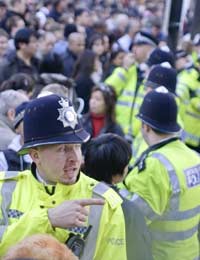Use of Sign Language in the Police Force

Naturally, the police come into contact with people from all walks of life when they are investigating crimes, reports of crimes and interviewing people. And equally naturally, many of these people will speak a different language. But while it cannot and should not be expected that police officers should speak any language other than the one spoken in the country where they work, sign language does pose a problem all of its own. While most foreigners and immigrants who do not speak English could at least get a message across or perhaps call someone who could do so on their behalf, it is far more difficult for a deaf person. Therefore, it can be suggested that some forces should take a slightly different approach to sign language, as there are many occasions when being able to ‘speak’ even just a few words of sign language would help officers and victims.
Courses
Few people can actually enjoy enforced courses for work, but the feedback from many police forces which have tried a sign language course is positive, as soon as officers start to learn sign language, they can see the numerous manifold benefits of having a police force able to communicate with people who may well have been marginalised because of their disability any way.And although there are plenty of sign language interpreters to assist deaf people in interviews and in court, the problem arises when officers are called to an incident and find themselves unable to converse with a person who needs them. Therefore, even a short course allows officers to learn some very basic skills to at least be able to ask and answer some very basic questions. British Sign Language tutors have delivered several day-long courses over a series of weeks to some police forces, where as many as 40 members of staff learn basics such as the alphabet and how to say their name. As well as making it possible for the officer to then elicit vital information from someone who speaks sign language, knowing that there is someone with them who knows even a tiny bit of sign language will put people, especially victims of crime, at ease at least a little. Other people even learn a small amount in an hour-long lesson.
Ad Hoc Lessons
Other forces have taken a more ad hoc approach to learning sign language. In Sheffield, a community support officer met a teenager with Downs Syndrome who used sign language and asked him to deliver lessons to staff at the local police station. The officer in question decided to invite the teenager along to the station after meeting him and realising they could not even ask his name because they did not have the necessary language skills. By asking him to deliver some lessons, they have gone some way to rectifying the situation, in their own station at least.The police, as with other emergency services, have to be able to communicate with all sorts of people. And people who cannot share their language due to a disability must be top of that list. In today’s society, there are all manner of laws and rules which state that public services must be accessible to all, but it is still warming to see how many forces are developing their own initiatives to improve their services to deaf people even further.
- How Much Do Courts Spend on Sign Language
- Holidays With a Difference: Signed Cruises
- Story Telling in Sign Language
- The American Sign Language Bill and its Repercussions
- Prisons' Use of Sign Language
- Sign Language Among Scuba Divers
- Sign Language in Religious Communities
- Using Sign Language for Work
- Using the Internet to Learn Sign Language
- Sign Language and Public Services
- Written Forms of Sign Language
- My Signing Experiences as a Deaf Person: A Case Study
- Use of Signs in Hearing Communities
- Sign Language in the Workplace
- Nicaraguan Sign Language Created by Children
- How to Convey Emotion
- Lip Reading
- How to Communicate with Deaf People


Re: The Importance of Establishing Home Alerts For Deaf People
Kak esehiko sminor k112 signedlanguage.co.uk
Re: The Listening Bus
Hi, We would like to book the listening bus for our school community. What is your availability for the summer term 2025? What are the costs? We…
Re: Sign Supported English
Ex Mary hare school. Love sign supported English as Aspie. More useful Less emotional As words Not emotion More helpful to deaf Aspies
Re: The Listening Bus
Hi, I am the inclusion leader and SENCo of a school with a specialist resource provision for deaf pupils within a mainstream school. Staff say…
Re: The British Sign Language Broadcasting Trust
I’m not effected in any way or suffer from any communication issues personally. I was curious as to why…
Re: Sign Supported English
I want a series of videos to learn SIGN SUPPORTED ENGLISH FOR BEGINNERS. Can you please help?
Re: Makaton
Hello We are a small pre-school and we are trying to teach all our children Makaton to help all of them communicate regardless of their own…
Re: Sign Supported English
Can anyone help me ? I am trying to find an SSE class or lessons in Kent and have had no luck. Failing that, are there any publications I…
Re: Hands on Signing
Hi I have a blind child and he has a moderate hearing loss. I wonder if you can help me to teach him sign language and I need to learn as well.…
Re: Sign Supported English
Does anyone know of any programmes or resources for using SSE with older people whose hearing has deteriorated in later life?